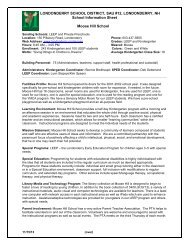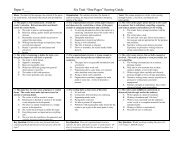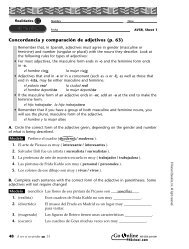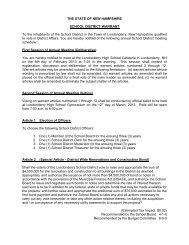eNvIRoNmeNtal sCIeNCe - College Board
eNvIRoNmeNtal sCIeNCe - College Board
eNvIRoNmeNtal sCIeNCe - College Board
- No tags were found...
You also want an ePaper? Increase the reach of your titles
YUMPU automatically turns print PDFs into web optimized ePapers that Google loves.
AP Environmental ScienceI n t r o d u c t i o nThe AP Environmental Science course is designed to be the equivalent of a onesemester,introductory college course in environmental science. Unlike most otherintroductory-level college science courses, environmental science is offered from awide variety of departments, including geology, biology, environmental studies,environmental science, chemistry, and geography. Depending on the departmentoffering the course, different emphases are placed on various topics. Some courses arerigorous science courses that stress scientific principles and analysis and that ofteninclude a laboratory component; other courses emphasize the study of environmentalissues from a sociological or political perspective rather than a scientific one. TheAP Environmental Science course has been developed to be most like the former; assuch, it is intended to enable students to undertake, as first-year college students, amore advanced study of topics in environmental science or, alternatively, to fulfill abasic requirement for a laboratory science and thus free time for taking other courses.The AP Course Description and AP Exam have been prepared by environmentalscientists and educators who serve as members of the AP Environmental ScienceDevelopment Committee. In both breadth and level of detail, the content of the coursereflects what is found in many introductory college courses in environmental science.The exam is representative of such a course and therefore is considered appropriate forthe measurement of skills and knowledge in the field of environmental science.T h e C o u r s eThe goal of the AP Environmental Science course is to provide students with thescientific principles, concepts, and methodologies required to understand the interrelationshipsof the natural world, to identify and analyze environmental problems bothnatural and human-made, to evaluate the relative risks associated with these problems,and to examine alternative solutions for resolving or preventing them.Environmental science is interdisciplinary; it embraces a wide variety of topics fromdifferent areas of study. Yet there are several major unifying constructs, or themes,that cut across the many topics included in the study of environmental science. Thefollowing themes provide a foundation for the structure of the AP EnvironmentalScience course.1. Science is a process.• Science is a method of learning more about the world.• Science constantly changes the way we understand the world.2. Energy conversions underlie all ecological processes.• Energy cannot be created; it must come from somewhere.• As energy flows through systems, at each step more of it becomes unusable.4© 2010 The <strong>College</strong> <strong>Board</strong>. Visit the <strong>College</strong> <strong>Board</strong> on the Web: www.collegeboard.com.















